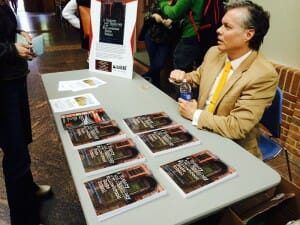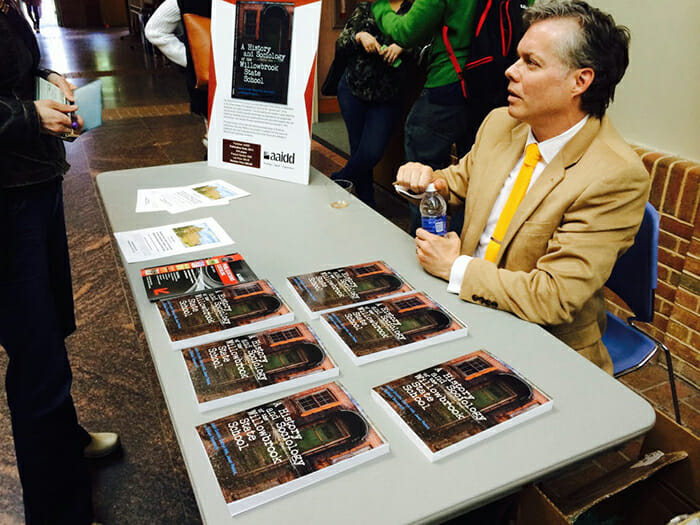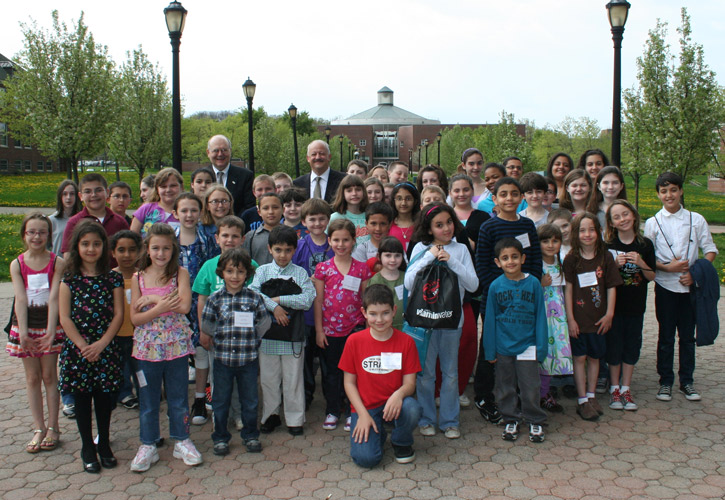
CSI professor Darryl Hill, with copies of the newly published "A History and Sociology of the Willowbrook State School." Photo Courtesy of Staten Island Advance/Virginia N. Sherry
STATEN ISLAND ADVANCE — The horrors endured at the former Willowbrook State School for developmentally disabled children and adults were remembered Wednesday afternoon at the College of Staten Island’s 21st annual Willowbrook memorial lecture at the Center for the Arts Recital Hall. (The campus of the College of Staten Island is the former location of the infamous Willowbrook State School for developmentally disabled children and adults.)
The theme of this year’s lecture was “Forgetting is Not an Option: Tragedies and Triumphs of American Deinstitutionalization.”
Moderator Henry Kennedy — an attorney with the firm of Willkie Farr & Gallagher, LLC, who has a daughter with developmental disability living in a nearby group home — recalled visiting the State School decades ago and finding “thousands held up in wards with no air-conditioning on hot summer days, with some of them on psychotropic drugs (tranquilizers).”
He stressed “how important it is to understand the history of this place,” and that state institutions such as Willowbrook were “products of government ignorance, arrogance and indifference.”
“The story requires telling again and again and again,” said Diane Buglioli, one of the speakers at the lecture and deputy executive director of the nonprofit A Very Special Place.
She worked at Willowbrook for over 10 years, when she was 19 to 30 years old, while studying for her college degrees.
“It was barren, it was sad, it was relentless,” she said about the conditions.
She recalled her first sight of a day room where 30 children were housed behind two locked steel doors. “Some were drooling, some were crying. … It was surreal and just wrong.”
The 6,000 children and adults housed at Willowbrook during the State School’s peak capacity were “denied their basic right to humanity,” she added, noting that prisons allotted 80 square feet per inmate while Willowbrook provided only 35 square feet per resident, “with no place to put a treasured item, no place to put their [personal] possessions.”
When Willowbrook was operational, “there were no background checks” for hired staff, said Ms. Buglioli. “There were people who did very good things, and people who did horrible things.”
A series of articles in the Advance documented the horrific conditions in which children and adults lived at Willowbrook.
The scandal generated national headlines when it was exposed by Geraldo Rivera, then a relatively unknown television reporter.
Willowbrook was closed in 1987 and set legal precedents that influenced the deinstitutionalization movement across the country.
Other speakers included James W. Conroy and Jean Searle, co-presidents of the Pennhurst Memorial and Preservation Alliance, a group hoping to preserve the memory of Pennhurst State School and Hospital, in Spring City, Pa., a facility similar to Willowbrook.
It opened in 1908 to house people with intellectual and developmental disabilities. Over 10,000 people were confined there until it, too, was closed in 1987, following exposes and U.S. Supreme Court landmark rulings, setting the stage for deinstitutionalization across the country.
“The disability rights movement is a civil rights movement,” Conroy reminded the audience.
Ms. Searle, one of eight siblings, all of them with disabilities, grew up in foster homes and institutions, and provided examples of abuses and indignities she endured.
For punishment, “they put me in a chair in a corner with my hands tied tight behind my back,” she recalled. She was not allowed to move or speak for the next few hours.
Also participating on the panel were CSI professors David Goode and Darryl Hill, co-authors of the newly published book, “A History and Sociology of the Willowbrook State School.”
Wednesday’s event — open to students, faculty and the public — was sponsored by CSI’s departments of sociology, anthropology and social work and the division of humanities and social sciences.
This article, written by Advance reporter Virginia N. Sherry, first appeared in the Staten Island Advance and on silive.com May 8, 2014. It is reprinted here with permission.















